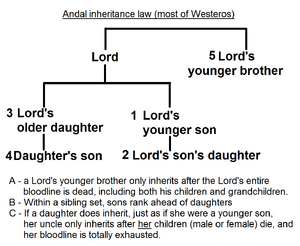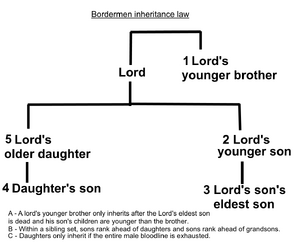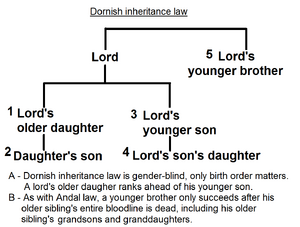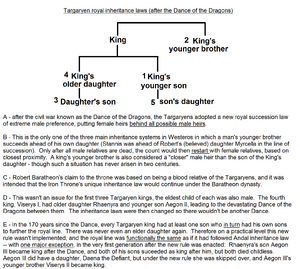- "Being a lord is like being a father, except you have thousands of children, and you worry about them all the time."
- ―Robb Stark
The social and political structure in the Seven Kingdoms is based on a system of Lords and lordship, in which political power is dominated by noble Houses.
The system of lordship may have been introduced in Westeros under the First Men, though its final form was achieved after the Andals invaded the continent six thousand years ago. In ancient times, every hill-lord called himself a "king", but over the centuries the stronger petty kingdoms absorbed the weaker ones, gradually aggregating into larger kingdoms. When Aegon I Targaryen began his invasion of Westeros, the continent was divided between seven large kingdoms. The Targaryen Conquest united the "Seven" Kingdoms into a single realm subordinate to the Iron Throne.
Social structure[]
The feudal society of the Seven Kingdoms is based on a rigid social structure dividing the population between a hereditary nobility set above commoners known as smallfolk. A strict political hierarchy is in place, consisting of kings and great lords who command the allegiance of lesser lords who serve as their vassals. This "government" is based on personal oaths of allegiance: while one can speak of "the realm" on a vague level, they do not possess an abstract concept of the "Nation-state" in modern terms.
Kings[]
A King is the male ruler of a monarchy or realm. Kings usually inherit their position by birth and rule for life or until abdication, though some like Aegon the Conqueror and Robert Baratheon become kings through conquest. The consort of a king is known as a Queen. A woman who rules a monarchy in her own right is known as a Queen Regnant, with her husband bearing the title of Prince Consort.
The offspring and siblings of kings hold the title of Prince or Princess.
Nobility[]
The Seven Kingdoms of Westeros are divided between many hundreds of noble houses of various sizes. In Westeros ultimate power derives from the King on the Iron Throne and descends through the Great Houses that rule the constituent regions of the continent to their vassals.
There are ten Great Houses, and each of them have a number of vassal houses (sometimes also referred to as lesser houses) in their liege. The most powerful vassal houses may themselves field armies of a few thousand and control large regions, while the smallest houses may be little more than impoverished landholders with only a few men to their name. Members of the nobility are called "highborn", in contrast to lowborn commoners.
Some of the most powerful noble Houses rival the smaller Great Houses in terms of wealth and the size of the armies they can field, e.g. House Harrigon rules Gornworth, a colossal castle in Westeros, and possesses large armies and fleets of its own. Other noble Houses, while technically holding this rank, are relatively poor.
A typical noble house is seated at a castle and controls the land around it, collecting tithes and taxes from farmers, lesser landholders and smallfolk. In times of war they are expected to recruit and maintain a number of soldiers for their lieges. In most of Westeros only men can become ruling lords, and women can only rule if the rest of the male line has been extinguished or if they are acting as regents for their sons until they become of majority.
In Dorne men and women have equal property, inheritance and ruling rights.
Knights[]
Knighthood is a rank and honor given to warriors who perform exemplary service for a lord or the realm in the Seven Kingdoms. Its members are known as "knights" and use the title "Ser", though this may be superceded by other titles such as "prince".
Knights follow a religiously influenced code of behavior and honor called "chivalry". This code states that knights must defend the weak and the innocent, must protect women and children, must fight fairly and honorably, and obey their lieges. How closely a knight follows this code varies immensely from individual to individual.
Commoners[]
The term smallfolk refers to the peasantry and common folk of Westeros, effectively anyone who is not part of a noble house - though smallfolk make up much of a noble household - or a knight - even though hedge knights are generally considered to be only one tiny step above smallfolk.
Most of the common population of the Seven Kingdoms are peasants who lead an agrarian lifestyle. Most are uneducated and illiterate. Unlike members of noble Houses, the smallfolk do not typically use surnames.
Inheritance laws[]
The feudal society of the Seven Kingdoms follows inheritance law based on primogeniture, a winner-take-all system in which the designated heir inherits all of their parents' lands and possessions, to the exclusion of younger siblings. This is in contrast to a system of partible inheritance, in which lands would be divided evenly among siblings upon the death of their parents.
As George R.R. Martin described inheritance in Westeros:
- "The laws of inheritance in the Seven Kingdoms are modelled on those in real medieval history...which is to say, they were vague, uncodified, subject to varying interpertations, and often contradictory.[1]..."Holdings are seldom divided. Nor are they combined, as a rule, although one person could concievably hold more than one title. The other major factor is the current lord -- if one decided to do something unusual with his estates, that would carry weight. (Might also cause disputes, though).[2]
The designated heir in line of succession is decided by birth order, in which an elder brother would inherit ahead of a younger brother. Many heirs will still try to provide for their younger siblings, giving them funds to live on or minor holdfasts to rule over in their name. For example, Tywin Lannister inherited all of his father's holdings, while his younger brother Kevan Lannister inherited no lands. Even so, Tywin looks out for his family, and has rewarded Kevan with substantial wealth over the years for his loyal service. However this is a matter of personal preference and not a requirement. In contrast to the Lannisters, when their bannerman Gregor Clegane succeeded to the rule of House Clegane, he gave absolutely nothing to his younger brother Sandor, at which Sandor struck out on his own to seek his fortune as a bodyguard in direct service to the Lannisters.
The other major rule under primogeniture inheritance law is that a lord's children will inherit before the lord's younger siblings. A lord's younger brother will only inherit once his older brother's bloodline is exhausted, leaving no surviving children or grandchildren. Officially, if a lord dies leaving an infant daughter and an adult younger brother, his infant daughter is first in line of succession. In practice, uncles and aunts often try to claim inheritance ahead of their nephews and nieces, feeling that they are better suited to rule. This is not always without good reason, as a noble House officially led by an infant daughter will be seen as weak and easy to attack by hostile neighbors. There have been many instances where an uncle claimed rule ahead of infant children of their older brother, and indeed had widespread support, and truly had only the best interests of the family's holdings in mind. Of course, there is also much truth to the trope of the wicked greedy uncle trying to cheat the rightful heirs out of the family lands. This sort of situation frequently leads to succession conflicts. Other times an adult daughter or a child son may be deemed unfit to rule, though this would be seen as a stretch by many of their vassals (if the only surviving child is not only an infant but a female, she stands the highest chance of having her succession disputed).
There are actually three different variations of primogeniture which are practiced in the Seven Kingdoms:
Male-preference Primogeniture[]

Andal inheritance law, followed in most of Westeros: male-preference primogeniture (click to expand).
Commonly known as simply "primogeniture", this is the standard inheritance practice throughout almost all of the unified realm of the Seven Kingdoms. In this system,children inherit in birth order, but daughters are counted behind sons. A lord's daughter would still inherit ahead of his own younger brother, because his bloodline is counted ahead of his brother's bloodline.
For example, the birth order in the current generation of House Stark is: Robb, Sansa, Arya, Bran, Rickon. The inheritance order, however, is "Robb, Bran, Rickon" followed by "Sansa, Arya". Thus, despite the fact that Sansa is the second-born Stark child, she actually follows her little brother Rickon in the line of succession.
As the children of a lord inherit before his younger siblings, if Robb Stark were ever to father a child, even if it was a daughter, it would become next in line of succession ahead of Robb's younger brother Bran. Thus the new succession order would be "Robb, Robb's child, Bran, Rickon, Sansa, Arya".
In House Lannister, Tywin's children are officially in the line of succession ahead of Tywin's younger brother Kevan. Normally, Jaime Lannister would be Tywin's legal heir, but he forfeited the right to all inheritance when he joined the Kingsguard (which also requires its members to take a vow of celibacy). Normally, this would mean that Tyrion Lannister stands ahead of his sister Cersei in line of succession, even though Tyrion is younger than Cersei. While there is little ambiguity that Tyrion should be Tywin's heir, Tywin despises his dwarf son so much that he has never acknowledged Tyrion as his legal heir, a gesture normally seen as a mere formality.
Male-preference Primogeniture in the Ashlands[]

Bordermen inheritance law, followed only in the Ashlands (click to expand).
Ever since the destructive and revolutionary War of Succession, The bordermen have come to develop a different set of inheritance laws than the rest of the Seven Kingdoms, mainly based on seniority. Like the Andals, inheritance greatly depends on primogeniture, sons having a stronger claim than daughters. However, age is another important factor in succession. The oldest male member of the family always ranks ahead from other members; this includes brothers who are older than firstborn sons and grandsons, except when they are disinherited or deceased. If so, the next oldest member will follow in succession. Women will find that they have a tougher time inheriting than in the rest of the Seven Kingdoms; even when a male great-grandson is younger than his female family members, he will be next in line for inheritance. It even goes so far that if all males of the main bloodline are deceased, far-removed cousins will be put ahead of female members of the main line.
For example, a borderman lord has three sons. His eldest son is dead and his secondborn son is disinherited. His eldest son's children are all adults. Instead of the lord's eldest grandson succeeding him (which would be case in the other regions), the lord's thirdborn son will become the new heir, if he's older than his nephew.
Equal Primogeniture[]

Dornish inheritance law: gender-blind, equal primogeniture (click to expand).
Dorne entered the Seven Kingdoms only a hundred years ago, not through conquest but through marriage-alliance with House Martell. As a result, it was allowed to maintain many of its unique local customs, such as the rulers from House Martell using the title "Prince of Dorne" instead of "Lord Paramount of Dorne", a relic from the time Dorne was independent and from past centuries when the Rhoynar lived in river-based city-states in Essos. The largest practical difference in their laws is that Dorne was allowed to continue to follow equal primogeniture. Under equal primogeniture, the eldest child inherits, regardless of whether they are male or female.
Equal primogeniture is practiced by all of the noble Houses in Dorne, including the ruling Prince of Dorne; thus when a woman succeeds to House Martell, she is styled "Princess of Dorne".
In the current generation, Prince Doran Martell has three children: his daughter Arianne, followed by his two sons, Quentyn and Trystane. Since Arianne is the oldest child, she is ahead of her two younger brothers in the line of succession, and has indeed been actively groomed her entire life to one day succeed her father as ruler of Dorne. Any children Arianne may have, male or female, will stand in line of succession ahead of her younger brothers and their children.
Hypothetically, if equal primogeniture were applied to House Stark, it would simply follow birth order: "Robb, Sansa, Arya, Bran, Rickon".
Royal Primogeniture[]

Royal Targaryen inheritance law, only followed by the Iron Throne: female heirs behind all possible male heirs. A king's younger brother inherits ahead of the king's daughter (click to expand).
About 170 years before the War of the Five Kings, a disastrous civil war occurred within House Targaryen when Rhaenyra Targaryen was challenged for the succession by her younger half-brother, Aegon II Targaryen. Although Rhaenyra had been officially designated as the heir by their father, Aegon II insisted that a younger brother always inherited ahead of an older sister. Afterwards, to ensure that another civil war would not occur for similar reasons, the Targaryens adopted a highly modified form of male-preference primogeniture which puts female heirs behind all possible male heirs. Under this variant, a king's daughter is put behind the king's younger brother in the line of succession. This is the least common succession law in the Seven Kingdoms, only followed by the royal family that sits on the Iron Throne, however by the same virtue, it is disproportionately important because it determines who will be monarch of the entire realm.
When Robert Baratheon overthrew House Targaryen in his rebellion, he paid token lip-service to the line of succession by claiming the throne on the basis of a distant family relationship with the Targaryens (being a second cousin of King Aerys II Targaryen). Thus, the new Baratheon dynasty founded by King Robert continued to function under the modified variant of royal primogeniture.
In "The Wolf and the Lion", Renly Baratheon and Loras Tyrell have a conversation in which they explicitly state that the royal line of succession after Robert is "Joffrey, Tommen, Stannis, Renly". Note that this skips over middle-child Myrcella, passing immediately from her brother Tommen to her uncle Stannis. For that matter, it also skips over Stannis's daughter Shireen, who would have been ahead of Renly under normal inheritance law.
Further, in "Cripples, Bastards and Broken Things", Sansa Stark and Septa Mordane state that if Sansa only has female children with Joffrey, Joffrey's younger brother Tommen would be ahead of them in the line of succession. This matches the modified royal variant of primogeniture from under the Targaryens, as under normal primogeniture laws with a common lord, a lord's daughters would inherit ahead of his younger brother.
At the time of Robert's Rebellion, the line of succession to King Aerys II was his son Crown Prince Rhaegar, then Rhaegar's infant second child, his son Aegon (who, had his father and grandfather lived and ascended the throne, would have ruled as "Aegon VI"). Aegon would have been followed by Rhaegar's younger brother Viserys. Only then would the possible female heirs of House Targaryen been considered, starting with Rhaegar's daughter and eldest child Rhaenys. Daenerys was actually only born after Rhaegar, Aegon, and Rhaenys had all died, but had none of them been killed, Daenerys would have been behind Rhaenys in line of succession.
Theoretically, the exiled survivors of House Targaryen continued to follow modified royal primogeniture. However, the principle was purely academic, as the only known survivors were Viserys Targaryen and his younger sister Daenerys, and Viserys would have been ahead of Daenerys in line of succession even under normal primogeniture (their great-uncle Aemon was forgotten by most, but had already refused the throne and taken himself out of succession by joining both the Maesters and the Night's Watch). After Viserys' death, Daenerys became the last Targaryen, making the principle even less significant. If Viserys had not been killed, and if Daenerys' stilborn son Rhaego survived as well, Rhaego would have become Viserys' immediate heir, ahead of Daenerys in line of succession.
Taken to its utmost extreme of putting female heirs behind all possible male heirs, Stannis may officially be ahead of Daenerys in line of succession. Viserys was always ahead of his distant cousin Robert, but Robert was still Viserys's closest male heir, and with Robert's death not long afterwards (coupled with Renly's death without issue) this makes Stannis the closest male heir. However, because Stannis has no sons, only his daughter Shireen, Daenerys is still ahead of Shireen in line of succession, and without a male heir, Daenerys' claim might still be seen as ahead of the Baratheon line. Either way, King Aerys sentenced the Baratheons to death in absentia as traitors during Robert's Rebellion, so Daenerys could probably just dismiss Stannis as a traitor to the throne along with his brother.

